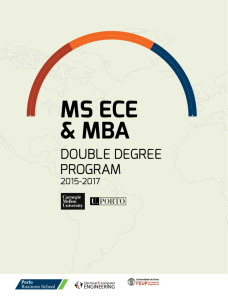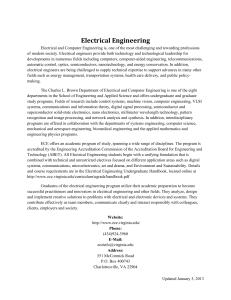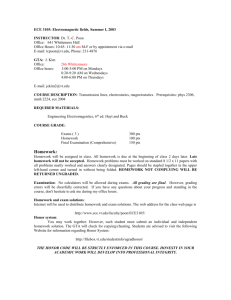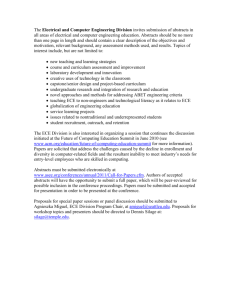ECE U468 Noise and Stochastic Processes, Spring 2005 School of
advertisement
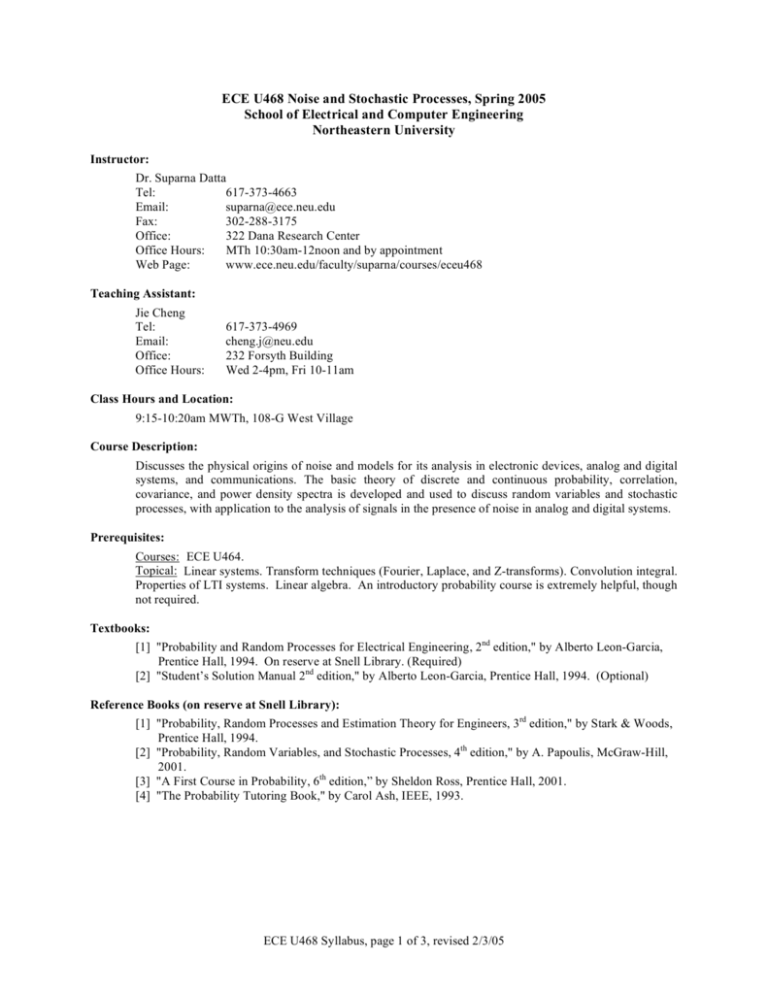
ECE U468 Noise and Stochastic Processes, Spring 2005 School of Electrical and Computer Engineering Northeastern University Instructor: Dr. Suparna Datta Tel: 617-373-4663 Email: suparna@ece.neu.edu Fax: 302-288-3175 Office: 322 Dana Research Center Office Hours: MTh 10:30am-12noon and by appointment Web Page: www.ece.neu.edu/faculty/suparna/courses/eceu468 Teaching Assistant: Jie Cheng Tel: Email: Office: Office Hours: 617-373-4969 cheng.j@neu.edu 232 Forsyth Building Wed 2-4pm, Fri 10-11am Class Hours and Location: 9:15-10:20am MWTh, 108-G West Village Course Description: Discusses the physical origins of noise and models for its analysis in electronic devices, analog and digital systems, and communications. The basic theory of discrete and continuous probability, correlation, covariance, and power density spectra is developed and used to discuss random variables and stochastic processes, with application to the analysis of signals in the presence of noise in analog and digital systems. Prerequisites: Courses: ECE U464. Topical: Linear systems. Transform techniques (Fourier, Laplace, and Z-transforms). Convolution integral. Properties of LTI systems. Linear algebra. An introductory probability course is extremely helpful, though not required. Textbooks: [1] "Probability and Random Processes for Electrical Engineering, 2nd edition," by Alberto Leon-Garcia, Prentice Hall, 1994. On reserve at Snell Library. (Required) [2] "Student’s Solution Manual 2nd edition," by Alberto Leon-Garcia, Prentice Hall, 1994. (Optional) Reference Books (on reserve at Snell Library): [1] "Probability, Random Processes and Estimation Theory for Engineers, 3rd edition," by Stark & Woods, Prentice Hall, 1994. [2] "Probability, Random Variables, and Stochastic Processes, 4th edition," by A. Papoulis, McGraw-Hill, 2001. [3] "A First Course in Probability, 6th edition,” by Sheldon Ross, Prentice Hall, 2001. [4] "The Probability Tutoring Book," by Carol Ash, IEEE, 1993. ECE U468 Syllabus, page 1 of 3, revised 2/3/05 Grading Policy: Homework: Exams: Final Exam: • • 10%, due at the beginning of class on due date. 55%, see schedule below. 35%, comprehensive. No late homeworks will be accepted after solutions have been handed out and/or posted on the class website. No make-up examinations will be given. Examination dates: Exam #1: Exam #2: Final Exam: February 24, 2005, 2:50pm-4:30pm, 108-G West Village March 24, 2005, 2:50pm-4:30pm, 108-G West Village April 20, 2005, 1:00 pm, room: TBD Email and Course Web Page: • • • You are required to send me an email with your legal name (and preferred name, if applicable), email address, and course title (ECE U468) no later than 01/07/2005 so that I can construct an email list for this class. All students are required to check their email everyday for any class updates or notices. Any changes or updates to the class syllabus or schedule will also be posted on the class website. Copies of homeworks, exams, and solutions will be posted there as well. Special Needs: Any student requiring any special accommodations because of a disability, please see me during office hours or send me an email immediately so that appropriate arrangements can be made. If special testing arrangements are required, you must bring your DRC letter to me immediately so that examination rooms can be reserved on your behalf. ECE U468 Syllabus, page 2 of 3, revised 2/3/05 Topical Outline: Basic Concepts of Probability Theory Sample space, events, set operations Axioms of probability Counting methods Conditional probability Independent events Sequential experiments Chapter 2 Random Variables Cumulative distribution function (CDF) Probability distribution function (PDF) Important random variables (discrete & continuous) Functions of a random variable Expected value of a random variable Markov and Chebyshev inequalities Goodness-of-fit Transform methods Chapter 3 Multiple Random Variables Vector random variables Pairs of random variables Independence of two random variables Conditional probability and conditional expectation Functions of multiple random variables Expected value of functions of random variables Jointly Gaussian random variables Chapter 4 Sums of Random Variables and Long-Term Averages Sums of random variables Sample mean and the laws of large numbers Central limit theorem Chapter 5 Random Processes Discrete-time random processes Continuous-time random processes Stationary random processes (RP) Wide-sense stationary (WSS) RP Cyclostationary RP Continuity, derivatives, and integrals of RP Time averages and ergodic theorems Chapter 6 Analysis and Processing of Random Signals Power spectral density Response of linear systems to random signals Chapter 7* * time permitting ECE U468 Syllabus, page 3 of 3, revised 2/3/05


